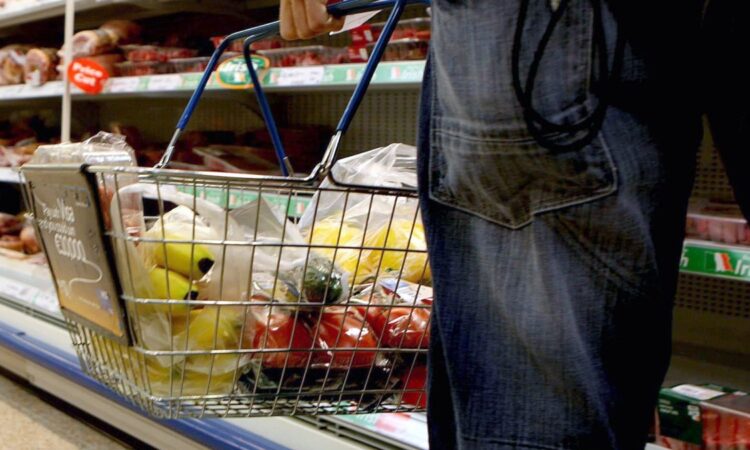What does falling inflation mean for my money? How 10.5% drop will impact UK savings and mortgages

Inflation eased slightly, dropping to 10.5 per cent in December, down from 10.7 per in November, with economists predicting it may have finally peaked.
Fuel and clothing were the main drivers behind the small decline, according to the Office for National Statistics (ONS), with the average petrol price down by 8.3 pence per litre in December.
However, households remain under pressure, with food and drink inflation soaring yet again, to 16.8 per cent, up from 16.4 per cent in November, marking the highest level since September 1977.
Overall inflation still remains five times higher than the 2 per cent target, underlining the scale of the challenge facing the Bank of England as it tries to tame prices without worsening an expected recession.
The Bank has raised interest rates nine times in a row since December 2021 and experts suggest it will likely increase to 4 per cent – up from 3.5 per cent – next month, the tenth consecutive hike.
Jeremy Hunt, Chancellor of the Exchequer, said: “High inflation is a nightmare for family budgets, destroys business investment and leads to strike action, so however tough, we need to stick to our plan to bring it down.
“We have a plan to go further and halve inflation this year, reduce debt, and grow the economy – but it is vital that we take the difficult decisions needed and see the plan through.”
i reveals what this means for your money.
What does this mean for your money?
Savings
There are no saving accounts that come close to bettering the inflation rate of 10.5 per cent, leaving savers to nurse negative returns on money held in cash.
The average easy access rate is returning just 1.56 per cent, according to Moneyfacts, with the highest returns coming from longer term fixed rates, for example two years or more, offering an average of 3.85 per cent.
Rachel Springall, Finance Expert at Moneyfacts, said: “While the savings market overall has been blessed by interest rate rises during 2022, almost 70 per cent of accounts now pay below the base rate of 3.5 per cent. The consecutive rises to the base rate should spur savers to check their existing savings accounts, particularly as challenger banks and building societies offer some of the best rates on flexible accounts”.
“As the cost of living crisis persists, savers may need to dip into their pots, so easy access and notice accounts could be the most suitable option that offers flexibility.”
Pensions
Double-digit rises are terrible news for pension savers looking to maintain their spending power during a cost of living crisis.
State pensions are set to rise substantially next April – by 10.1 per cent, September’s inflation figure, which is traditionally used to uprate benefits the following year. This should help ease the impact of the cost of living and will likely coincide with further falls in inflation.
More from Saving and Banking
However, for now, there is a risk pension savers reduce or stop the pension contributions they make, as they focus instead on paying everyday bills. Others may decide to work and longer and delay their retirement.
Recent data from the Pensions and Lifetime Savings Association (PLSA) shows lower income retirees are having to find nearly 20 per cent more to put into their pension pots to offset inflation.
It found the cost of sustaining a “minimum” lifestyle for a single pensioner has risen from £10,900 to £12,800 (18 per cent). The cost of doing so for a couple has increased from £16,700 to £19,900 (19 per cent).
Meanwhile, the cost of a “moderate” lifestyle, where pensioners can spend more on their food shop and have a yearly holiday, increased 12 per cent to £23,300 for a single retiree and by 11 per cent to £34,000 for a couple.
Pensioners at the higher end – in the comfortable bracket – have seen an increase of 11 per cent to £37,300 for a single person and 10 per cent to £54,500 for a two-person household.
Rio Stedford, financial planning expert at Quilter, said: “While the state pension will keep up with inflation through the triple lock, your private savings will not unless you do something about it.
“Historically, the best way to beat inflation is by keeping money invested in the stock market but this also carries risk. Choosing well diversified and risk appropriate investments is key for those nearing or in retirement particularly with the spectre of inflation looming down.”
People with a defined benefit pension may see their income increase in line with inflation but many of these schemes impose a cap. Checking with your scheme is key if you have this type of pension.
Myron Jobson, Senior Personal Finance Analyst at interactive investor, explains when inflation might come down and why
Annuities
A lowering of inflation will be mostly good news for those who bought annuities, which provide an income for life.
Most people have bought annuities with no inflation protection, meaning they have been exposed to surging prices, so an easing in the headline rates should be good news for them.
Some annuities have inflation protection baked into the terms of the contract, but this is often capped, and if inflation exceeds the cap, as it did for many last year, then income falls in real terms.
Alice Haine, Personal Finance Analyst at Bestinvest, said: “Annuities have been deeply out of favour for many years, due to the low rates available amid the era of cheap money, with most retirees choosing to stay invested and draw an income from their pension pot instead.
“However, gilt yields rose significantly last year which has also driven up annuity rates. For some retirees, a blended approach towards retirement of both purchasing an annuity to cover basic costs, alongside drawdown on the rest of their pension pot can be the right one.”
Phone bills
Households will soon pay over £100 a month for their phone and broadband bills as firms hike their prices in line with inflation, and beyond.
Most providers are expected to announce price increases soon with the majority raising bills by the January reading of consumer price inflation (CPI) or retail price inflation (RPI) – while also adding up to 3.9 per cent on top of that for good measure.
This means millions of people’s bills will rise – mid-contract – by up to 15 per cent, probably in April, when most providers implement their increases.
Some will see huge increases, for example, the average BT bill payer will be paying £50 more this year for their mobile or broadband contract, but BT’s most comprehensive package, which is currently £90 a month, will go over £100.

Mortgages
One of the consequences of inflation remaining high is the prospect of the Bank of England further increasing interest rates and the knock-on impact on mortgages.
With 1.4 million fixed rate mortgage deals set to expire this year, many homeowners will face much higher mortgage repayments when they sign up for a new offer unless they have been able to overpay in the run-up to the end of their deal. The Bank estimates average repayment hikes of £250 per month when homeowners switch onto a new product.
People remortgaging now should consider opting for a variable rate loan with no penalty for switching, which will allow them to fix when rates come down.
A higher cost of living hurts disposable incomes, something lenders examine carefully when assessing a borrower’s creditworthiness which will have a knock-on effect on house prices.
It means first-time buyers may not be able to borrow as much as they could a year ago, while those looking to refinance at a time when house prices are expected to slide may find their loan-to-income ratio is adversely affected.
Has inflation peaked?
The Bank of England expects inflation to decelerate sharply from the middle of this year before falling back to the 2 per cent target in two years’ time.
Analysts agree that inflation may have peaked, expecting it to finally start its descent from the current 40-year highs, but this does not mean immediate relief for households.
The data “suggests the peak has now passed” for inflation, said David Bharier, head of research at the British Chambers of Commerce. “But this simply means that prices will stabilise at a much higher level than one year ago.”






